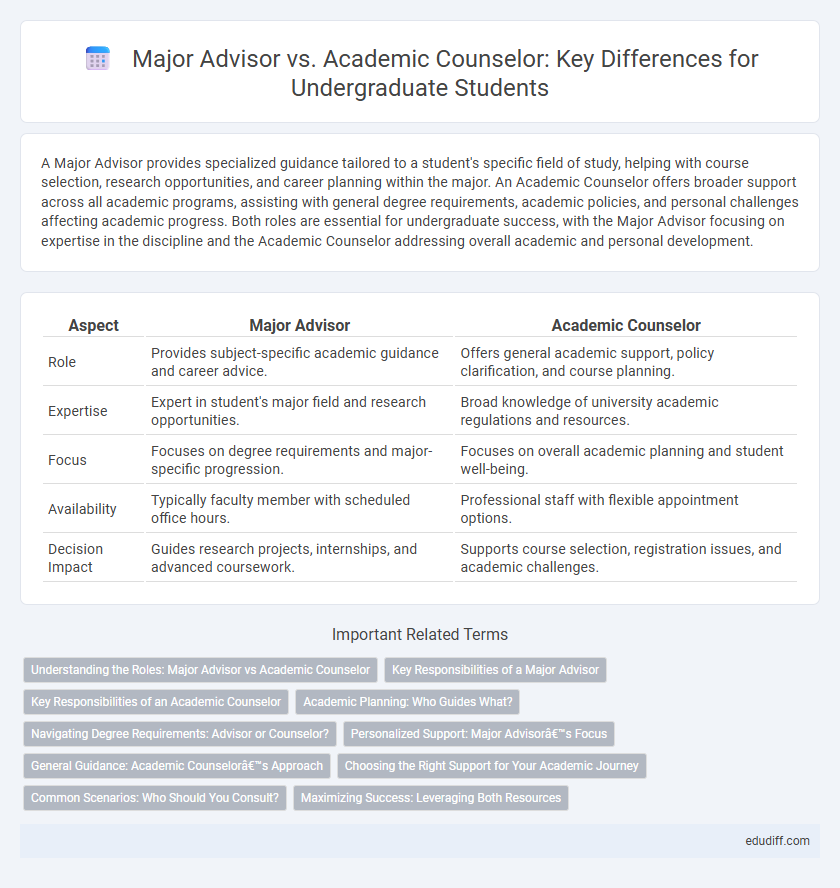A Major Advisor provides specialized guidance tailored to a student's specific field of study, helping with course selection, research opportunities, and career planning within the major. An Academic Counselor offers broader support across all academic programs, assisting with general degree requirements, academic policies, and personal challenges affecting academic progress. Both roles are essential for undergraduate success, with the Major Advisor focusing on expertise in the discipline and the Academic Counselor addressing overall academic and personal development.
Table of Comparison
| Aspect | Major Advisor | Academic Counselor |
|---|---|---|
| Role | Provides subject-specific academic guidance and career advice. | Offers general academic support, policy clarification, and course planning. |
| Expertise | Expert in student's major field and research opportunities. | Broad knowledge of university academic regulations and resources. |
| Focus | Focuses on degree requirements and major-specific progression. | Focuses on overall academic planning and student well-being. |
| Availability | Typically faculty member with scheduled office hours. | Professional staff with flexible appointment options. |
| Decision Impact | Guides research projects, internships, and advanced coursework. | Supports course selection, registration issues, and academic challenges. |
Understanding the Roles: Major Advisor vs Academic Counselor
A Major Advisor specializes in guiding students within their specific academic discipline, helping with course selection, research opportunities, and career paths related to the major. An Academic Counselor provides broader support, addressing general academic policies, degree requirements, and personal issues affecting academic progress. Understanding these distinct roles ensures students receive targeted guidance for both their major-specific and overall academic success.
Key Responsibilities of a Major Advisor
A Major Advisor primarily guides undergraduate students in selecting courses, aligning academic plans with career goals, and ensuring fulfillment of major-specific degree requirements. They provide personalized support on research opportunities, internship placements, and professional development within the student's field of study. Their role is essential in helping students navigate departmental policies and prepare for graduate education or employment.
Key Responsibilities of an Academic Counselor
An Academic Counselor primarily focuses on providing personalized academic guidance, helping students select appropriate courses, and ensuring they meet graduation requirements. They assist in addressing academic challenges by offering support with study skills, time management, and navigating educational policies. Unlike Major Advisors, who specialize in subject-specific mentoring, Academic Counselors deliver holistic support to help undergraduates succeed overall.
Academic Planning: Who Guides What?
Major advisors specialize in guiding undergraduate students through discipline-specific academic planning, including course selection aligned with major requirements and career goals. Academic counselors provide broader support by assisting with general education requirements, academic policies, and overall degree progress to ensure timely graduation. Both play crucial roles in comprehensive academic planning, with major advisors focusing on depth within the chosen field and academic counselors addressing university-wide academic standards.
Navigating Degree Requirements: Advisor or Counselor?
Major advisors provide specialized guidance on degree requirements, course selections, and career pathways within a specific department, ensuring students meet program standards efficiently. Academic counselors offer broader support by addressing overall academic planning, general education requirements, and university policies across multiple disciplines. Both roles are essential for navigating degree requirements, with advisors focusing on major-specific details and counselors offering institution-wide academic advice.
Personalized Support: Major Advisor’s Focus
Major advisors provide personalized guidance tailored to a student's specific academic interests and career goals within their chosen field, helping to select courses, plan research projects, and navigate internships or job opportunities. They possess in-depth knowledge of departmental requirements and connect students to faculty resources, enhancing academic success and professional development. This targeted support distinguishes major advisors from academic counselors, who offer broader institutional guidance without specialized expertise in a student's major.
General Guidance: Academic Counselor’s Approach
Academic counselors provide broad guidance by helping undergraduate students navigate course selections, degree requirements, and campus resources. They focus on overall academic planning and resolving general concerns, ensuring students stay on track for timely graduation. Unlike major advisors who specialize in specific disciplines, academic counselors offer comprehensive support across all fields of study.
Choosing the Right Support for Your Academic Journey
A Major Advisor specializes in guiding students through specific degree requirements, course selection, and career paths related to their chosen field of study, offering expertise tailored to their academic discipline. An Academic Counselor provides broader support including academic planning, personal development, and navigating university policies, helping students manage their overall college experience. Selecting the right support depends on whether students need subject-specific advice or comprehensive academic and personal guidance throughout their undergraduate journey.
Common Scenarios: Who Should You Consult?
Consult your Major Advisor for guidance on academic planning, course selection within your major, and career goals related to your field of study. Reach out to your Academic Counselor for help with general university policies, registration issues, and navigating graduation requirements across different departments. Both play crucial roles in ensuring a successful undergraduate experience, but their expertise targets different aspects of your academic journey.
Maximizing Success: Leveraging Both Resources
Maximizing undergraduate success involves strategically leveraging both your Major Advisor and Academic Counselor to enhance academic planning and career development. Your Major Advisor offers specialized guidance on course selection, research opportunities, and field-specific skills, while the Academic Counselor provides institutional knowledge, helps navigate graduation requirements, and connects you with campus resources. Combining personalized mentorship from your Major Advisor with the comprehensive support from your Academic Counselor creates a robust framework to optimize academic achievement and future career prospects.
Major Advisor vs Academic Counselor Infographic

 edudiff.com
edudiff.com